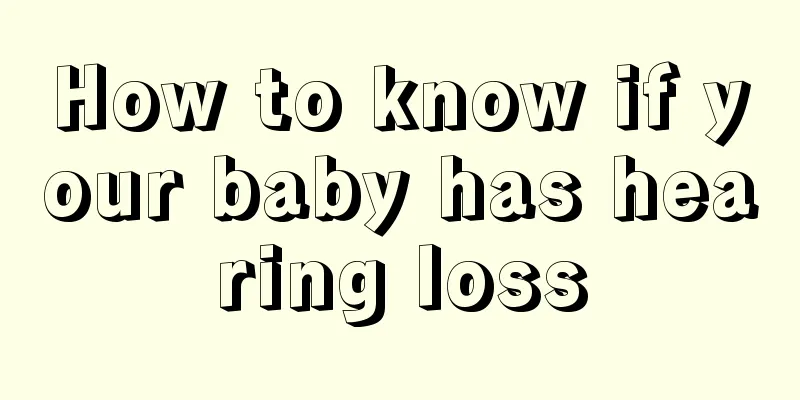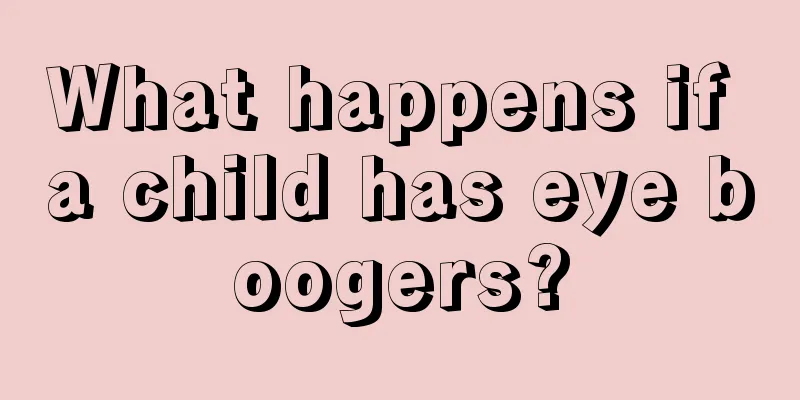How to know if your baby has hearing loss

|
How do we know if a baby has hearing impairment? Many babies have hearing impairment when they are born, but parents are unaware of it because babies cannot speak and do not understand anything. This can cause big problems. Many babies’ hearing impairments are not detected, and the best treatment period is missed. So everyone needs to know how to detect hearing impairment in babies. Among human senses, hearing is one of the important ways for humans to obtain external information and communicate with the outside world. In childhood, hearing is an essential part of children's language learning. Studies have shown that 6 months to 3 years old is a critical period for children's language learning. Hearing impairment during this period will directly affect the child's speech development, and in severe cases can cause deafness and dumbness. Because children cannot express themselves clearly or do not know how to express themselves, they often miss the best period for treatment and speech learning, which affects their lives. So, how can we observe children's hearing development and detect hearing impairment in their daily lives? You can pay attention to the following danger signs of your child: 1. No response or decreased response Infants and young children at different stages react to sounds differently, such as startling, blinking, turning the head or body towards the sound source, etc. If you find that the child has no reaction to sound or the reaction decreases; if when talking to the child, the child often asks "what" or "say it again", indicating that he did not hear clearly, or often asks the other party to raise the volume, you should pay enough attention. 2. Speak late or have unclear pronunciation Most children's speech development follows certain patterns. A newborn can cry at one month old, laugh loudly and babble at four months old, utter monotonous syllables at five to six months old, can hear other people talking and imitate the sounds after seven to eight months old, children at nine to ten months old can understand the meanings of several more complex words, such as "goodbye", children at eleven to twelve months old can say monosyllabic words among them, children at one and a half years old can correctly say some meaningful words such as "rice" and "socks", at two years old they can address different people differently, such as "auntie" and "uncle", at three years old they can sing short songs, and at four years old they can express their wishes in complete sentences. If a child is found to have obvious speech delay or unclear articulation, parents should not blindly believe that "it's just the old saying that it's just the old saying that's good". In addition to caring about children's intellectual development and pronunciation organs, we also need to pay attention to children's hearing problems. 3. Frequent falls without reason Children under 3 years old do not know how to express their subjective feelings of dizziness. If you find that your child often falls for no reason, you need to pay attention. After excluding diseases such as cerebellar tumors, an ENT doctor should be consulted to assist in diagnosis and treatment. Various diseases such as inner ear malformation and Meniere's disease can cause hearing loss accompanied by vertigo. 4. Often say "ears buzzing" "Ringing in the ears" is medically known as tinnitus. When your child tells you that his ears are ringing, you should pay attention. Often a large proportion of tinnitus patients have more or less hearing loss. Many reasons such as otitis media and ototoxic drug poisoning can cause tinnitus and should not be ignored. Also, in daily life, if a child likes to stare at the other person's mouth when listening to someone speak, likes to turn up the volume when watching TV, often answers questions irrelevantly in class, and his grades drop, etc., these are all dangerous signs of hearing impairment. Of course, despite parents' great concern, some children with hearing loss will still be missed, especially those with mild to moderate deafness and unilateral deafness. Therefore, regular hearing screening plays a vital role in the early detection of children’s hearing problems. I hope that all parents will pay attention to this. Hearing impairment in infants should attract the attention of parents. Generally speaking, hearing impairment in infants is difficult to detect, and parents are unaware of some abnormal situations, which will lead to many serious problems. Therefore, everyone needs to know some symptoms of hearing impairment in infants and detect hearing impairment in infants in time. |
<<: How many times a day is normal for babies to poop
>>: What causes baby's hands to peel?
Recommend
What are the symptoms of zinc deficiency in children? Several types of children who are prone to zinc deficiency
It may seem that there is no problem for children...
Causes of pharyngitis in children
We know that since children's organs are not ...
Children's princess hair
Every girl has a princess dream, especially when ...
What are the precautions for babies just born?
When babies are just born, parents are always wor...
Why do children grind their teeth at night?
Many children have some bad living habits, and so...
Children's hair grows slowly
Everyone hopes that their hair can grow faster, b...
What is the reason for the red spots on the baby's buttocks?
Babies have irregular bowel movements. In order t...
How to cure indigestion in children?
In today's society, more and more children ar...
What medicine is good for children’s stomachache?
Children are very fragile and if they are not tak...
What foods can cause precocious puberty in children?
Children's growth and development is the topi...
What to do if your newborn has short legs
Newborns follow certain rules in the process of d...
What are the symptoms of anemia in a one-year-old baby?
Recently, many babies have suffered from anemia t...
Treatment of chickenpox in children
We may have seen many children suffering from var...
What should I do if my one month old baby doesn't sleep during the day?
Is it normal for babies not to sleep during the d...
My child's arm is swollen after vaccination
Sometimes parents will find that their children&#...









